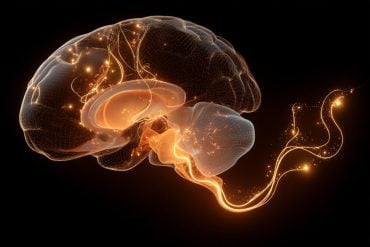Summary: A single exposure to CBD reduced seizure severity and improved both motor deficits and abnormal brain activity in mouse models of Angelman syndrome.
Source: University of North Carolina Health Care
A marijuana plant extract, also known as cannabidiol (CBD), is being commonly used to improve anxiety, sleep problems, pain, and many other neurological conditions. Now UNC School of Medicine researchers show it may alleviate seizures and normalize brain rhythms in Angelman syndrome, a rare neurodevelopmental condition.
Published in the Journal of Clinical Investigation, the research conducted using Angelman syndrome animal models shows that CBD could benefit kids and adults with this serious condition, which is characterized by intellectual disability, lack of speech, brain rhythm dysfunction, and deleterious and often drug-resistant epilepsy.
“There is an unmet need for better treatments for kids with Angelman syndrome to help them live fuller lives and to aid their families and caregivers,” said Ben Philpot, PhD, Kenan Distinguished Professor of Cell Biology and Physiology and associate director of the UNC Neuroscience Center.
“Our results show CBD could help the medical community safely meet this need.”
CBD, which is a major phytocannabinoid constituent of cannabis, has already shown to have anti-epileptic, anti-anxiety, and anti-psychotic effects. And in 2018, the FDA approved CBD for the treatment of seizures associated with two rare forms of epilepsy, but little is known about the potential anti-seizure and behavioral effects of CBD on Angelman symptom.
The Philpot lab is a leader in the creation of genetically modified mouse models of neurodevelopmental disorders, and they use these models to identify new treatments for various diseases, such as Rett, Pitt-Hopkins, and Angelman syndromes.
In experiments led by first author Bin Gu, PhD, a postdoctoral fellow in the Philpot lab, the UNC-Chapel Hill researchers systematically tested the beneficial effects of CBD on seizures, motor deficits, and brain activity abnormalities – as measured by EEG – in mice that genetically model Angelman syndrome, with the expectation that this information could guide eventual clinical use.

The researchers found that a single injection of CBD substantially lessened seizure severity in mice when the seizures were experimentally triggered by elevated body temperature or loud sounds. A typical anti-convulsant dose of CBD (100 mg/kg) caused mild sedation in mice but had little effect on motor coordination or balance. CBD also restored the normal brain rhythms which are commonly impaired in Angelman syndrome.
“We’re confident our study provides the preclinical framework necessary to better guide the rational development of CBD as a therapy to help lessen seizures associated with Angelman syndrome and other neurodevelopmental disorders,” Gu said.
Philpot and Gu added that patients and families should always seek advice from their physician before taking any CBD products, and that a human clinical trial is needed to fully understand its efficacy and safety.
Funding: The National Institutes of Health and the Angelman Syndrome Foundation funded this work.
Other authors were Madison Glass, Marie Rougié, Viktoriya Nikolova, Sheryl Moy, PhD, and Paul Carney, MD, all of UNC-Chapel Hill.
Source:
University of North Carolina Health Care
Media Contacts:
Mark Derewicz – University of North Carolina Health Care
Image Source:
The image is in the public domain.
Original Research: Closed access
“Cannabidiol attenuates seizures and EEG abnormalities in Angelman syndrome model mice”. Bin Gu, Manhua Zhu, Madison R. Glass, Marie Rougié, Viktoriya D. Nikolova, Sheryl S. Moy, Paul R. Carney, and Benjamin D. Philpot.
Journal of Clinical Investigation doi:10.1172/JCI130419.
Abstract
Cannabidiol attenuates seizures and EEG abnormalities in Angelman syndrome model mice
Angelman syndrome (AS) is a neurodevelopmental disorder characterized by intellectual disability, lack of speech, ataxia, EEG abnormalities, and epilepsy. Seizures in AS individuals are common, debilitating, and often drug-resistant. Therefore, there is an unmet need for better treatment options. Cannabidiol (CBD), a major phytocannabinoid constituent of cannabis, has antiseizure activity and behavioral benefits in preclinical and clinical studies for some disorders associated with epilepsy, suggesting that the same could be true for AS. Here we show that acute CBD (100 mg/kg) attenuated hyperthermia- and acoustically-induced seizures in a mouse model of AS. However, neither acute CBD nor a two-weeklong course of CBD administered immediately after a kindling protocol could halt the pro-epileptogenic plasticity observed in AS model mice. CBD had a dose-dependent sedative effect, but did not have an impact on motor performance. CBD abrogated the enhanced intracortical local field potential power, including delta and theta rhythms observed in AS model mice, indicating that CBD administration could also help normalize the EEG deficits observed in individuals with AS. Our results provide critical preclinical evidence supporting CBD treatment of seizures and alleviation of EEG abnormalities in AS, and will thus help guide the rational development of CBD as an AS treatment.






